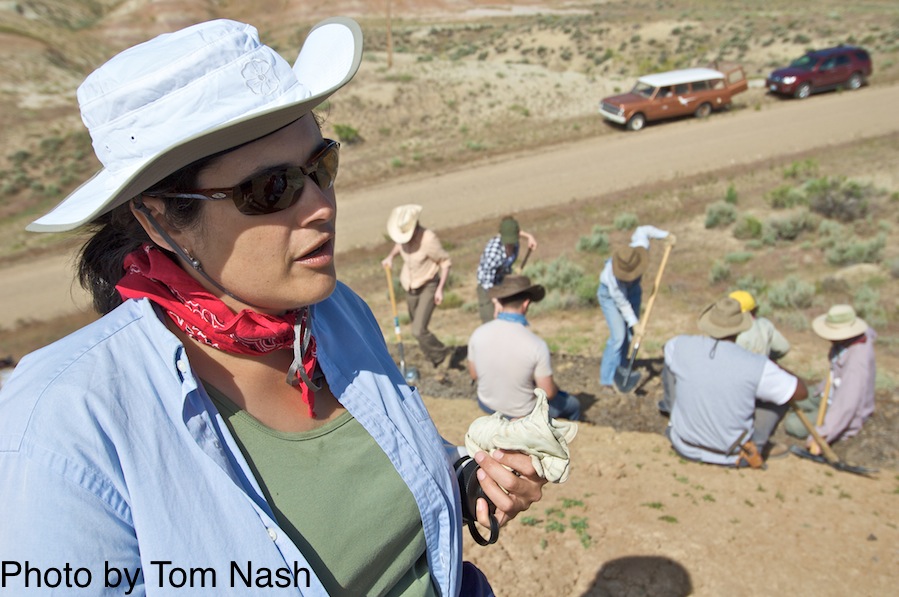
PhD and MS from the University of Chicago, BA from Yale University
Field sites past & present: Australia, Wyoming, Colorado, North & South Dakota, Nebraska, Kansas, Illinois
For most of my early experiences doing fieldwork (research trips, not class fieldtrips), I was the only woman. I am incredibly grateful that I was always treated as “one of the guys” and had the same jobs as everyone else (no extra time on kitchen duty for me!). These were wonderful experiences that convinced me I wanted to pursue graduate work in paleontology and spend as much time doing fieldwork as possible. Nevertheless, self-doubt crept in since I saw so few women over the course of these early trips, and even fewer women leading field crews. So imagine my delight when a female postdoc (later professor) began taking a larger and larger role in one of the major research teams in the Bighorn Basin, where I was doing my PhD fieldwork. It was encouraging to watch her interact with her (mostly male) colleagues, treating them as equals and being treated by them as an equal. And to watch her kick butt collecting samples in the hot Wyoming desert!
Cesca calls herself a geochemist, but I think we can also classify her as a paleontologist because she studies how plant life responded to climate changes in the geologic past. But rather than using fossil leaves, wood, fruits, or pollen, Cesca focuses on plant molecules that are preserved in the rock record: molecular fossils, one might call them. Leaves have a waxy coating that is extremely resistant to decay and is often incorporated into sedimentary rocks. Cesca and her lab group spend their field time digging trenches to collect uncontaminated sediments. They take these back to the lab, use a series of chemicals to isolate the leaf waxes, and then use a mass spectrometer to look at the isotopic composition of the waxes. The isotopic composition can be used to reconstruct changes in climate and vegetation. Recently, Cesca has been studying the Paleocene-Eocene Thermal Maximum (PETM), a geologically abrupt global warming event ~55 million years ago that is the best geologic analog for modern-day global warming. A more complete understanding of the climatic and ecological changes that occurred during the PETM may help us better predict what the coming centuries will bring and how we should focus conservation efforts.
Not only is Cesca an incredible scientist, she is also a wonderful mentor, both in formal and informal settings. She genuinely cares about the welfare of everyone around her. My favorite memory of this: generally on Friday nights, all the paleontologists working in the southern Bighorn Basin meet up in Worland for a “night on the town.” One night, we were in the karaoke bar when an incredibly stoned local started getting a little too friendly on the dance floor with one of the female students. Cesca immediately came over, got in the guy’s face, and challenged him to a dance-off. I was hoping it would go all Zoolander, but as Cesca was just starting to bust out her moves, he slunk away. And that is quintessential Cesca, doing whatever it takes to ensure the safety of those in her charge.
You can learn more about Cesca at: http://www.adelaide.edu.au/directory/cesca.mcinerney
A short movie on Cesca’s work in the Bighorn Basin of Wyoming is available at: http://www.youtube.com/watch?v=C9bfVKkqIoA